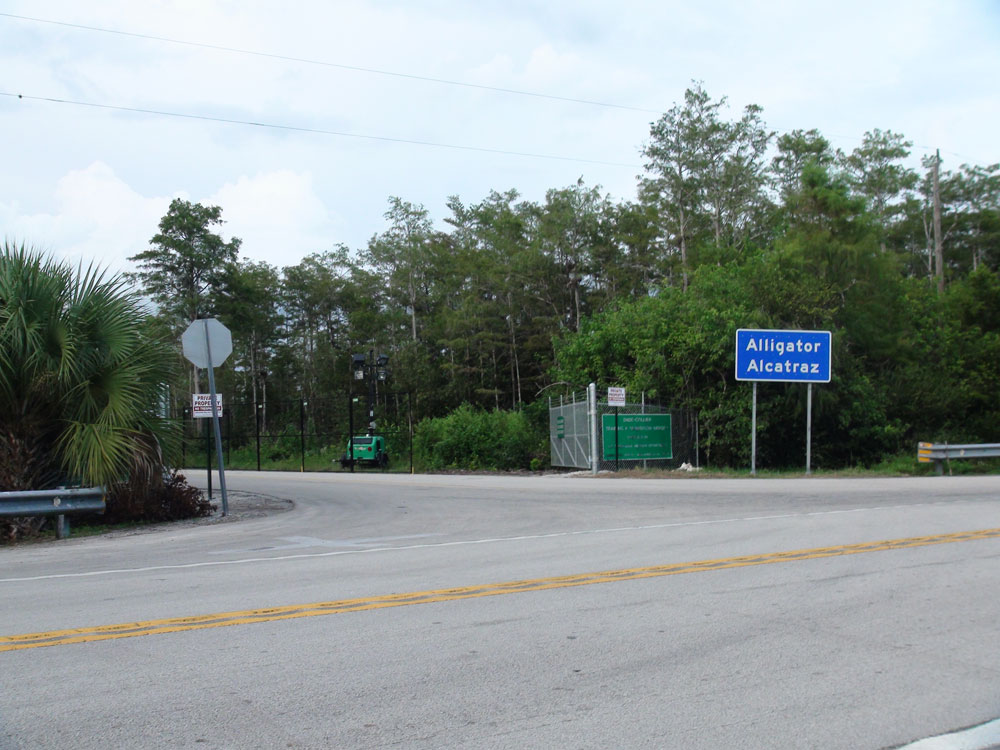As environmental organizations and the Miccosukee Tribe prepare for the next phase of the court battle, Governor Ron DeSantis is refusing to back down from a contentious immigrant-detention center in the Everglades after a federal judge ordered his administration to start destroying the facility.
A preliminary injunction prohibiting further construction and the transfer of further detainees to the complex, which the state has named Alligator Alcatraz, was ordered by U.S. District Judge Kathleen Williams on Thursday. Additionally, Williams mandated that temporary fences, detention center lighting, and items like generators be removed within 60 days.
DeSantis’ attorneys promptly sent a notice of appeal to the 11th U.S. Circuit Court of Appeals, located in Atlanta, regarding Williams’ decision.
In an interview with reporters on Friday morning, DeSantis dismissed Williams’ choice.
We knew exactly what this judge would do as soon as she received the case. “We will make sure to finish the job in the end, but this is not anything that was unexpected,” he said.
The Miccosukee Tribe of Indians of Florida joined the lawsuit, which was filed by Friends of the Everglades and the Center for Biological Diversity. The lawsuit claims that the DeSantis and Trump administrations disregarded a federal law that mandated an environmental impact study prior to the facility’s construction. The facility is located next to the Dade-Collier Training and Transition Airport, a remote airstrip.
The tribe contended that the detention center jeopardizes its religious and traditional rituals in the nearby Big Cypress National Preserve, where its members have resided for ages. In a court filing, the tribe’s attorneys contended that the detention center is situated in the center of the tribe’s ancestral homelands, which are home to hundreds or maybe thousands of protected ceremonial and religious sites.
Attorney Curtis Osceola, tribal chairman Talbert Cypress’s senior policy assistant, told reporters Friday that the Miccosukees were quite glad and thrilled with Williams’ order.
The psychological damage and mental anguish that our children and young people would experience as a result of this facility being imposed on their homelands will last for generations, which is why we are still worried, Osceola stated.
The plaintiffs cited several hazards from the project to wetlands and endangered species whose habitats include the area surrounding the facility, according to Williams’ order.
According to the judge’s order, the plaintiffs also demonstrated that the camp’s runoff and wastewater discharge pose a risk of contaminating the water supply in the Miccosukee Reserved Area, where 80% of the tribe’s members live, just a few miles downstream from the facility and beyond.
She also noted that the project’s industrial lighting, noise, traffic, and security perimeter have continuously harmed the tribe’s ability to enjoy the preserved regions.
Williams also mentioned fencing that has blocked access to the preserve and other problems that have impacted the tribe.
The camp’s operations have prevented tribal members from using the off-road trails that go into the Big Cypress National Preserve (BCNP) grounds for hunting and other purposes. Additionally, Williams noted that although tribal members had traditionally collected plants for ceremonial and medicinal purposes from the areas immediately surrounding the site, the additional human activity in the camp undermines the plant life’s cultural importance.
According to Osceola, the tribe was not contacted before the facility was built.
Osceola declared on Friday that the judge’s ruling truly upholds the rights of the tribe and that we will keep defending our homelands and sovereignty. Chairman Cypress asked me to add that we will not compromise and that we will keep fighting for our homelands.
Osceola admitted that Williams’ ruling is being appealed by the state.
We’re willing to take the matter all the way to the Supreme Court. The tribe has been involved in such conflicts before. He went on to say, “We are ready to fight and we are ready to win, but it probably won’t be the last.”
The National Environmental Policy Act, a federal regulation that mandates assessing potential environmental repercussions before such a project can proceed, is allegedly violated in the case, which was filed in the federal Southern District of Florida. Allowing the public to comment on possible projects is a step in that process that takes time.
In order to avoid all of that and to make a statement regarding immigration, the state decided to proceed with the complex without first undertaking an environmental review, according to Osceola.
Rather, they boldly declared that we are prepared to sacrifice the government for political reasons. “I believe that was a significant issue for the tribe and something we had to contend with,” he continued.
As part of the state’s attempts to assist President Donald Trump’s crackdown on illegal immigration, DeSantis recently stated that his government plans to turn a Baker County prison that has been mothballed into a second detention facility. When asked if the state intended to abide by Williams’ decision while the appeal was being considered, the governor’s office did not immediately reply.
Osceola wondered why the Everglades were the site of the institution.
Nobody in the government was able to provide a clear response. He claimed that the plaintiffs and everyone else in the room could see that this was a publicity ploy and that there was no other explanation.
The two-month attrition of detainees would give the state time to remove the recently erected fencing, lighting, and other fixtures and utility apparatus in a safe, humane, and responsible manner, according Judge Williams, who ordered the state to stop operations at the facility within 60 days.
In order to avoid damage or deterioration, her decree also permitted housing and prison facilities to stay in place and be maintained. According to her, the state did not do the federal law-mandated examination of alternatives to the Everglades site.
Environmental groups’ lawyer, Paul Schwiep, described the Williams ruling as a crucial first step in the battle for the Everglades complex.
Building a 5,000-person detention facility in the middle of the Everglades is illogical, according to any logical NEPA (National Environmental Policy Act) study of the alternatives to this location and the effects that this site poses. According to Schwiep, the governor has previously acknowledged that there are other options.
Dara Kam, Florida News Service







